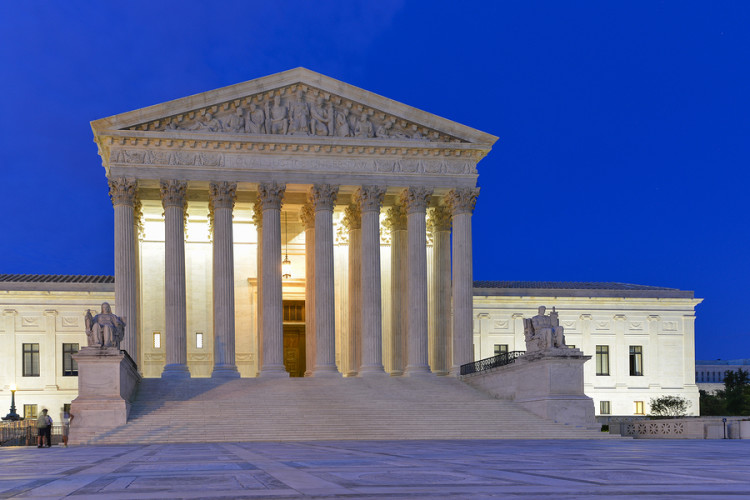Internet Tax Ruling Worth Billions Poised for Court Review

published Sep 14, 2017 3:42:36 PM, by Jef Feeley
(Bloomberg) —
The South Dakota Supreme Court brought the question of whether online retailers should pay sales tax back into sharp focus.
The Mount Rushmore state’s highest court ruled Thursday that companies selling wares over the Internet can’t be forced to collect South Dakota’s 4.5 percent tax on purchases, laying the groundwork for a U.S. Supreme Court appeal that could change law across the country. A decision forcing online retailers to collect such taxes could be worth billions in revenue to state and local governments.
The court backed an appeal by online retailers Overstock.com Inc., Wayfair Inc. and NewEgg Inc. challenging a state law that required companies that do more than $100,000 worth of business in online sales in the state to collect sales taxes.
The law ran afoul of the U.S. Supreme Court’s 1992 decision in Quill Corp v. North Dakota, which forbade states from requiring retailers without a physical presence to collect sales tax. Justice Anthony Kennedy has suggested in later rulings that the court reconsider the decision.
Kennedy’s views, combined with the South Dakota court’s “quick but complete dispatch of the case, significantly enhance the chances that the U.S. Supreme Court will agree to consider the case during the next term,’’ said Deborah White, a lawyer for the Retail Industry Leaders Association.
Managers of New Egg, based in City of Industry, California, didn’t immediately respond to emails seeking comment. Caroline Burns, a spokeswoman for Boston-based Wayfair, declined to comment.
Jonathan Johnson, an executive for Salt Lake City, Utah-based Overstock, called the South Dakota ruling “another failed effort to get companies to become their tax collectors.” Johnson said backers of Internet sales taxes put too much emphasis on a single line of one of Kennedy’s opinions and are off base with assurances that the high court will take the South Dakota case.
“Even if the Supreme Court takes it, they are likely to rule the same way they did in 1992,” he said.
Trump’s Bruising Tweet Highlights Amazon’s Lingering Tax Fight
The sales-tax issue has become a hot potato for online retail giant Amazon.com Inc., which is jousting with the state of South Carolina over disputed payments. In June, the Palmetto State filed a complaint alleging Amazon failed to collect taxes on sales made by third-party merchants on the retailer’s online marketplace.
South Carolina claims Amazon owes $12.5 million in taxes, penalties and interest for the first three months of 2016. That figure “will continue to accrue until this matter is resolved,’’ state officials have said. Amazon officials didn’t return an email Thursday seeking comment on the South Carolina case or the South Dakota ruling.
Amazon began collecting sales taxes on purchases in all states that levy them earlier this year. But the online retailer avoids charging shoppers sales taxes when they buy from one of its third-party vendors — sales that make up about half the company’s volume.
Critics say untaxed third-party sales have an advantage over brick-and-mortar retail chains, which have their own robust online operations but have to collect sales tax on all purchases in states where they have physical presences. Many large chains have stores in almost every state.
Trump Criticism
President Donald Trump has backed the idea that online retailers, such as Amazon, should pay the same sales taxes that retailers with physical stores pay and has been critical of the online retailer’s policies.
The South Dakota statute that required online retailers to cough up sales tax was specifically drafted so the state’s highest court could quickly reject it and send it up for U.S. Supreme Court review, said Robert Desiderio, a University of New Mexico Law School tax professor.
Technology has outstripped tax policy and the Supreme Court should address whether all retailers should pay their fair share of taxes, Desiderio said. “Should it really make a difference if the sale is over the Internet or at a store?’’ he asked.
States also have a legitimate claim to the loss of tax revenue tied to Internet sales, the professor said. Some analysts estimate states and local government lose about $5 billion a year in taxes from Amazon marketplace commerce.
The South Dakota opinion, authored by Chief Justice David Gilbertson, acknowledged the state’s interests in collecting Internet sales taxes, but said it was bound by the 1992 Supreme Court ruling.
“However persuasive the state’s arguments are on revisiting the issue,” the two-decade old ruling is controlling law and South Dakota’s judges were forced to bow to the highest court’s “prerogative in overturning its own decisions,” Gilbertson said.
The South Dakota case is State of South Dakota v. Wayfair Inc., 28160-a-GAS, Supreme Court of South Dakota (Pierre).
Updates with company comment in seventh paragraph.
–With assistance from Spencer Soper.To contact the reporter on this story: Jef Feeley in Wilmington, Delaware at jfeeley@bloomberg.net To contact the editors responsible for this story: David Glovin at dglovin@bloomberg.net Paul Cox, Sophia Pearson
copyright
© 2017 Bloomberg L.P




No Comment